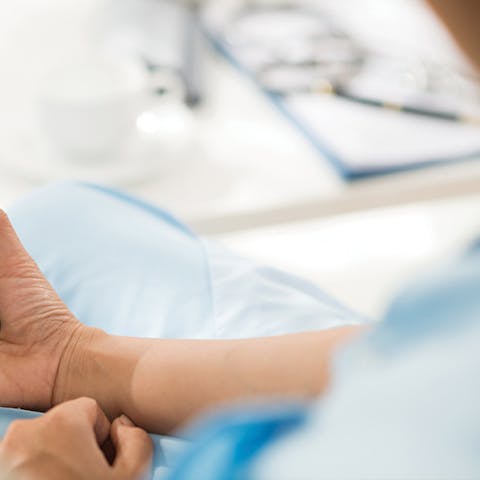MedTech Week Magazine 2018 At a glance
Highlights from the 3rd Edition of the Award-Winning MedTech Week Magazine
784,154
Twitter accounts reached
#MedTechWeek used 3000+ times
I take this opportunity to sincerely thank all our members for their enormous efforts in making the role of medical technologies more widely known during MedTech Week 2018 last June.
Now in it's fourth year, MedTech Week brings out the best in the companies and national associations that represent our industry. Together, they have served up dozens of examples in unwavering ingenuity to illustrate the value of medtech.

20
Countries
Engaged
50
Members
Involved
16
External
Partners
2
million+
views
18,000
website visits
49,000
video views
Bringing Sound & Vision to the message
Articles

Keeping you running
MedTech Europe go the extra mile in Brussels

Hidden heroes
MedTech is all around us but often goes unseen – and undervalued

Virus or bacterium?
Knowing the cause of an illness helps accelerate recovery, avoids waste of resources and reduces antimicrobial resistance

Sports therapy
Exploring the connection between sport, health and medtech

Race against time

The next French medtech Unicorns
Young companies rewarded for innovative new creations

Boot Camp
Start-ups find inspiration in six-month accelerator program

Food for thought
Access to innovation was on the menu at ‘parliamentary breakfast’

Extraordinary stories, ordinary lives
Meet the patients for whom medtech is a way of life

Tomorrow’s world
Digital health will boost patient safety and tackle infection control
Perspectives

‘Dialysis at home: savings lives, preserving autonomy’
Dialysis can be essential to the wellbeing of people living with kidney failure.

‘Committed to protect our health from Roberto Bertollini, HFE honorary president’

‘Thinking smarter & working harder to deliver Value-Based Healthcare – Together’
Michelle Brennan, Chair of the Board of MedTech Europe and Company Group Chair, Johnson & Johnson Medical Devices Companies, Europe, Middle East & Africa (EMEA)

‘Artificial intelligence: The next revolution in healthcare?’
At the turn of the century, healthcare companies were at the zenith of an ‘innovate-manufacture-sell’ business model.

‘How digital technologies will reshape musculoskeletal healthcare’
Digital technologies provide an opportunity to move musculoskeletal care to the heart of value-based healthcare. MedTech Views spoke to Satschin Bansal of Zimmer Biomet about some of the innovations that will change the field.

‘Colorectal cancer: don’t delay diagnosis’
Colorectal cancer is the third most common cancer in the world and the second most common in Europe. The disease can be fatal but early diagnosis and intervention are improving outcomes for patients.

‘Diagnosing STIs: faster tests for chlamydia and gonorrhoea can help reduce the spread of disease’
Advances in diagnostic technologies give patients same-day test results for sexually transmitted infections (STIs) such as chlamydia and gonorrhoea.

‘Asthma is a struggle – imagine carrying a 50kg stone around all day’
For people living with severe asthma, daily tasks can be a real challenge.

‘Digital health is here – time to take the lead’
How do we prepare Europe for future technologies?

‘Diagnosing Deafness’
Timely cochlear implant surgery can significantly help deaf children’s speech, language, cognitive and socio-emotional behaviour.

Food for thought
Access to innovation was on the menu at ‘parliamentary breakfast’
Home care and eHealth can improve the lives of patients, by bringing healthcare closer to the user and streamlining how services are delivered. That was among the key messages for politicians at a breakfast meeting on 6 June hosted by SPECTARIS, the German industry association for high-tech medium-sized businesses in medical technology.
The event attracted Dr Ralf Brauksiepe, the Federal Government’s Commissioner for Patient Affairs; Dr Roy Kühne, a leading member of the Bundestag Committee on Public Health; Dietrich Monstadt, board member of the parliamentary group representing medium-sized businesses, and numerous other members of parliament.
The interactive meeting was an opportunity for companies to share the industry’s positive impact on patients, and for politicians to explore how policy can support this.
Martin Braecklein of Linde Healthcare called for an easier path to market for digital applications. ‘Above all, eHealth means increased benefits for the patient,’ he argued. ‘Illnesses can be detected earlier, diagnoses can be made more reliable, hospital stays avoided or shortened. We therefore need to secure digital networking of all stakeholders in the healthcare sector.’
Participants also heard how the quality of homecare can be improved and why focusing on the overall value – rather than purchase prices – improves outcomes for patients and health systems. Company leaders also offered insights on how regulation affects innovative companies that drive progress and economic growth in the sector.
Politicians recognised the importance of the industry to the health sector and the economy and agreed that the constructive exchanges would continue at future parliamentary events.






